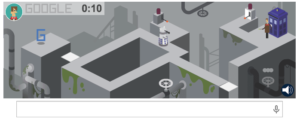I should be writing a paper right now, but I couldn’t leave this day without any comment about this lovely google doodle. I was having my cup of tea, a very sunny and cold day and then, first page, Doctor Who game. Brilliant.
1- “I should be writing a paper right now…”
Oh wait, here is one of the key elements of building a very good game: games create curiosity. In that case, I’m a fan of Doctor Who, so I would be invited to interact with the doodle anyway. But try to get some elements that caught attention to play: button, colours, animation. That’s interface for you.
2- “Oh, look, all the Doctors are there and you can choose one to play!”
When you recognise elements from the narrative of the game, you are inside the game world. You know the story. If your Doctor dies, he regenerates into another Doctor. That’s brilliant. That’s the narrative element.
3- The world is ending and you’re still playing the game
That’s the element that we call as flow. Some people say that this can be also called as engagement. If you are too deep into the game you’re so immersed that you can forget to eat. That’s what happens. So let’s try to build a definition of games, based on what we know:
Games are interactive systems that promote immersion, engagement and fun. In other words, games are built around gameplay elements, that create a world of possibilities, through aspects like flow, narrative, visual concepts, animation, sounds, challenges(levels) and constraints(rules).
4- Exterminate!
Sound. The good thing about a good game is the sound, interaction, interface and system. The sound plays a special role here. What’s a Dalek that doesn’t say “Exterminate!”? So, take note. Another element is sound! That will create immersion. Oh, I think we can get another element using the Daleks: you can die! So take another note: games give you another chance — and you learn by it.
5- Fun
The fun element is a mixture of all the other elements, since the recognition with the program, to the animation and sound. The idea of each level with different worlds is also interesting — it promotes curiosity. The whole mechanics of the game is built around the Doctor Who story and that’s what calls the attention, through the interactive elements.
What can we learn?
Well, I must admit that I still need to write the paper, but yes, we can learn that mini-games like that are successful. Why? Because of the concept. Games are pure interaction. If I could have the numbers of people that played that game, it would be interesting just to prove that games bring emotions, experiences and engagement. Let’s see what’s going to be tomorrow — the day of the Doctor and I won’t miss. Now I need to stop and write my paper.
First published by @vanissa on Medium, in 22/11/2013 – just moving some posts from there to here :)
